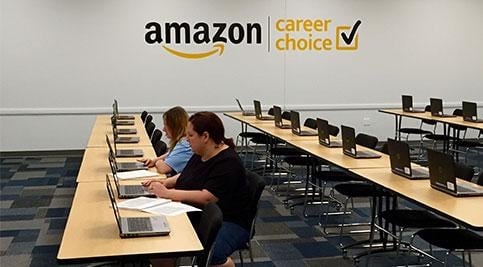You have /5 articles left.
Sign up for a free account or log in.

Delaware Technical Community College
Amazon, the dominant force in online shopping, wants its employee tuition assistance program to be the go-to way that corporations help their workers pursue career and technical education.
The retail giant has run its tuition assistance program, known as Career Choice, for about four years. During that time, more than 6,000 employees -- most of them working in Amazon’s many warehouses across the country -- have participated.
Earlier this month, Amazon said it will take the program “open source,” meaning it will share with other companies the building blocks of the program for them to “build upon it, tailor it for their own use cases and improve upon it.”
Compared to other programs, Career Choice ranks among the more flexible. Once employees have been with Amazon for a year, they only need to cover 5 percent of tuition and fees -- Amazon covers the rest up front and also reimburses 95 percent of textbook costs. Full-time employees are eligible for $3,000 in tuition assistance a year up to a maximum of $12,000; part-time employees, half that.
Of course, there’s a catch. The tuition assistance can only be spent on certificate and two-year programs, for one. Additionally, Amazon employees can’t study whatever they want, but rather pick from a list of what the company -- looking at data from the U.S. Bureau of Labor Statistics -- has deemed to be “high-demand fields,” broadly speaking, in the U.S. job market. Examples include accounting, engineering, health care and information technology, among others.
But Amazon isn’t using Career Choice to primarily train workers for the company’s own needs. In fact, the program invites employees to study a topic they are “passionate about, whether that’s at Amazon or elsewhere.”
"Amazon believes that people should pursue what they’re passionate about, whether that’s a long-term career at Amazon or something that they’ve always dreamed of doing in another industry," a spokesperson for the company said in an email. "We want to be the kind of company that will support an individual get the skills they need for today’s most in-demand fields.… [W]e know that it’s great for employees, for business and -- if other companies join us in offering something similar -- this can be great for society."
Amazon’s labor practices -- among both blue- and white-collar workers -- have been closely scrutinized and harshly criticized as the company has become the most valuable retailer in the U.S. The company has one of the highest turnover rates among Fortune 500 companies, and the average employee reportedly stays with the company no longer than 11 to 18 months.
Benefit programs such as tuition assistance are sometimes seen as a way for a company to improve its image -- especially since only about 5 percent of employees participate in such programs. A high turnover rate might further drive down the participation rate. Yet as more companies launch new tuition assistance programs or expand existing ones, some economists say the trend shows companies are investing in their employees in response to heightened competition.
Robert Kelchen, an assistant professor of education at Seton Hall University who has studied partnerships between colleges and corporations, said limiting tuition assistance to certain fields may be Career Choice’s “main innovation.”
“It's a really interesting model, given its focus on in-person education,” Kelchen said in an email (many other tuition assistance programs, such as the partnership between Arizona State University and Starbucks, have emphasized online education). “I look forward to seeing how it develops.”
In addition to encouraging its workers to go out and enroll at community colleges, Amazon is bringing some local institutions to its locations. In Delaware, for example, the company has partnered with Delaware Technical Community College, building the community college a 30-seat classroom in its Middletown warehouse (see photo). DTCC has offered six noncredit certificate courses since January 2015 in fields such as computer fundamentals, general maintenance and health care.
Rachel Anderson, assistant director of corporate and community programs at DTCC, said Amazon has been “very amenable” to the community college’s needs, filling the classroom with the necessary equipment. When the institution wanted to teach a course on bookkeeping with accounting software, Amazon supplied a computer cart. To simulate a hospital room for a certified nursing assistant course, the company added a hospital bed and curtains.
In-state students pay $135.75 a credit hour at DTCC, meaning a three-credit-hour course costs an Amazon employee participating in Career Choice only about $20. The community college is considering offering stacking credentials through the program so that students can take multiple courses and become certificate patient care technicians, Anderson said.
Amazon is a major presence in in the Middletown job market. The warehouse employs about 3,500 people, but that number more than doubles during the peak months in the lead-up to Black Friday and Christmas, Anderson said.
Despite the size of the pool of potential students, the Career Choice program hasn’t led to a major enrollment bump for DTCC -- largely because of the community college’s self-imposed class size restrictions. The largest course seats only 18. The partnership has enrolled 74 total employees, all of them adult learners with varying degrees of experience with higher education -- some of whom started and stopped out, others for whom Career Choice is their first time entering college.
Anderson said the community college is satisfied with the partnership, and that it views Amazon as an important partner when it comes to building programs that teach the skills companies in the state are looking for in new hires.
“It is part of our mission to offer relevant training for our industry partners,” Anderson said. “Being the only community college in Delaware puts us in a unique position where we can talk directly to our partners and they can help us inform our training development. Amazon fits right into that very nicely.”




